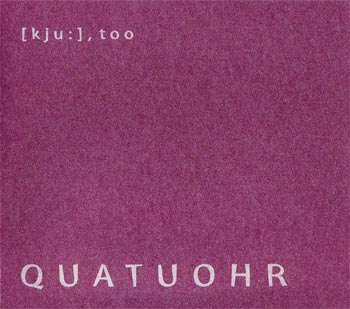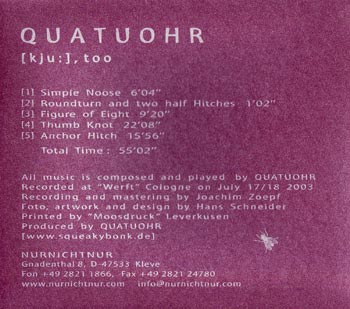
[kju:], too - Joachim Zoepf

Schlagwerks, selbst das Unken und Schnarren der Bassklarinette und gequetschte Trillern und Krächzen des Sopranos wirbeln so schwerelos, flüchtig und quantensprungteuflisch durch den Raum wie Brown‘sches Molekülpingpong, wie Maxwell‘sche Dämonen, die im Zeitraffer durchsichtige Gebilde konstruieren, 3-D-Illusionen, die an ihren transparenten Karnickelohren aus ebenso unsichtbaren wie unerschöpflichen Zylindern gezogen werden. Absicht und Zufall, [‚ar‘kju:] und Reflex, Konstruktion und haptischer Automatismus tauschen ihre Differenzkriterien gegen ein polymorph-pervers flimmerndes ‚Wir‘.
Rigobert Dittmann, Bad Alchemy 49
Klopotek - In the discussion about free improvisation there exist two radically opposed points of view. There are those for whom free improvisation should strictly exist only in the a one off encounter, thus enabling the maximum spontanaeity. This would typify the music of someone like Derek Bailey. If you look at his discography you will discover countless projects where he has played only once with each of the musicians involved. The logic behind this is that a second meeting would only detract from the spontanaeity, directness, and moments of surprise. The other point of view in this discussion believes the opposite: that regular playing in a group enables free improvisation to evolve. The more you get to know the other players, the better you can play together. Every time the players meet there evolves a unified, shared understanding out of which free improvisation can develop. This collective understanding brings the freedom, not the first time spontenaeity. It is easy to see
where Quatuohr fit in this scheme of things. Zoepf, Charig, Schliemann and Schneider have been meeting for some years now in Cologne in order to regularly work on their music, playing concerts at first once a week, and then later, every two weeks. There is practically no other band on the scene of improvisors that works like this. This is all the more remarkable when you consider that the four musicians are not newcomers who are trying out their skills in their first improvising combo. They all have at least twenty-five years of experience in this sort of music. To come back to our thesis: Quatuohr are among the second sort of improvisers, the collectivists, but if you think that this is the only element in their music you are missing the essence. Quatuohr have condensed playing together (in a communicative, not a physical sense) so much, that questions of category, arrangement, or sense of structure take second place. This means, you don`t have a group that through grappling with a
set of musical problems arrive at certain sort of music. You hear a finely worked out almost perfectly constructed music. It could be strictly composed (in the sense of the post serial music of Franco Evangelistis). But don`t get me wrong! I am not trying to say that it sounds like New Music. Quatuohr have emancipated themselves from the idea of `sounds like´. Strictly speaking one must say that Quatuohr sounds like Quatuohr. Having discussed all this we should now listen to what is really happening within the group. The musicians have mastered the trick of playing in a very condensed manner at the same time retaining transparency. Each moment is unexpected. They all play all the time and in spite of this allow space between themselves. It doesn`t matter whether Schneider reacts, Schliemann acts, Charig wriggles in between or Zoepf pushes out front, everything is to the point but remains surprising, because the players, and therefore the situation, remain open. The opportunity of
choice is always there. There is no charismatic figure or bandleader in this group, they are all bandleaders, and where everybody is a bandleader the role does not exist. It may be that Quatuohr consciously wanted to set something up against the school that plays once together and then never again. This rather limiting starting point is, however, not important anymore because the original stance has become fruitful field of musical activity. Quatuohr play with great self-confidence at the same the music is far away from any sense of complacency. It has the capacity for change, indeed they have at the moment policy of inviting musicians from other improvising areas to play with them. This will bring in new influences. I look forward to hearing their next CD as well.
Translated by Marc Charig
Das zweite NurNichtNur-Album von Mark Charig (Cornet, Althorn), Joachim Zoepf (Bassklarinette, Sopransax), Hans
Schneider (Bass) und Wolfgang Schliemann (Percussion) zeigt erneut, wie fein in dieser Musik alles auf einander abgestimmt
ist. Die Besetzung dieses Quartetts ist ja eigentlich eine ganz herkömmliche Jazzbesetzung, wie es sie seit den
50ern gibt. Doch hier geht es zunächst um die untypischen, überraschen-den Klänge der Instrumente. und
erst, wenn die Musik auf eigenständigem festen Boden ist, dann werden auch Statements diskutiert, die aus dem
herkömmlichen Jazz stammen mögen.
Die vier Improvisatoren haben, was in dieser Szene eher selten vorkommt, über einen längeren Zeitraum
kontinuierlich zusammengearbeitet. Dadurch zeigen sie größte Ensemblesicherheit bis in kleinste Details
auch bei den abenteuerlichsten Momenten ihrer Musik. Hier stimmt alles, obwohl nichts geplant ist - diesen scheinbaren
Widerspruch können nur die ganz guten Improv-Ensembles feiern und dazu gehört Quatuohr.
My Way 60